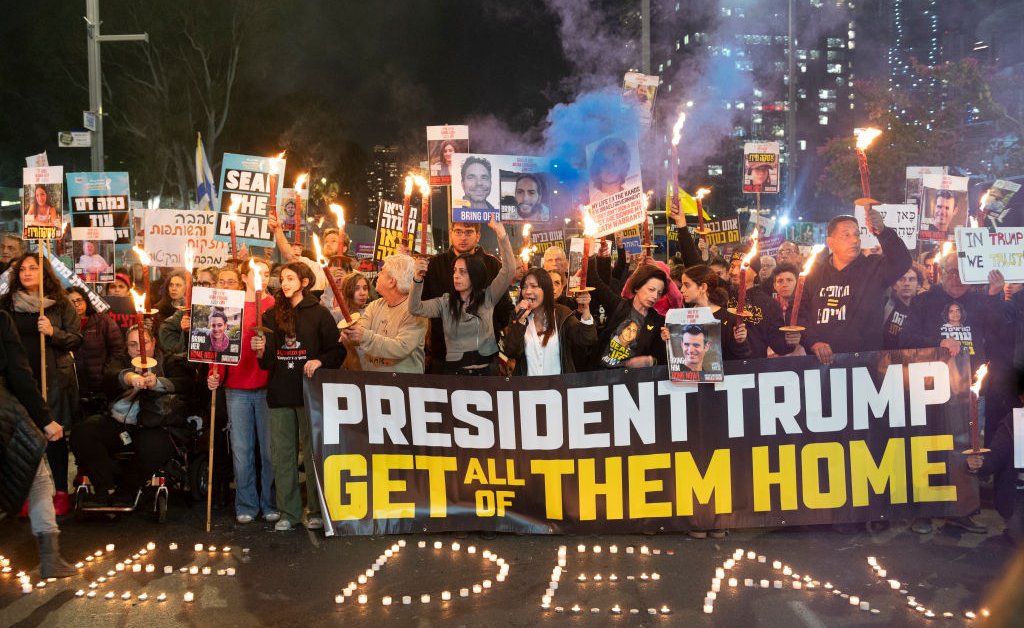President Donald Trump will welcome Israeli Prime Minister Benjamin Netanyahu at the White House next week, marking the first visit of a foreign leader to Washington in Trump’s second term. The trip comes on the heels of the Israel-Hamas ceasefire in Gaza. However, the ceasefire is unlikely to hold if Netanyahu believes he can resume the war with U.S. support. That’s why Trump should throw his full weight behind a permanent end to the war, and make clear to Netanyahu that if the ceasefire falls apart and the war resumes, the U.S. will not be involved.
The window for Trump to do this is already closing. There is evidence that neither Netanyahu nor his coalition partners want the war to end. Israeli national security minister Itamar Ben-Gvir has already resigned over the ceasefire and hardline finance minister Bezalel Smotrich has threatened to bring down the government if Israel does not resume the war after the first 42-day phase of the agreement, and if Netanyahu refuses to re-occupy Gaza.
Behind closed doors, Netanyahu has reportedly been reassuring extremist members of his coalition that the war will resume with U.S. support if phase-two negotiations over a permanent end to the war fail. But a return to fighting in Gaza would become an albatross around Trump’s neck, much as it was for Joe Biden, and would fundamentally go against U.S. interests.
The first reason is that there is little evidence that the war will achieve Netanyahu’s stated ends: the destruction of Hamas rule in Gaza and the release of all the hostages. The leveling of Gaza and the killing of much of Hamas’ leadership has thus far has not produced either goal. Hamas remains the dominant political and military force inside the enclave, and former Secretary of State Antony Blinken recently said Hamas has recruited almost as many fighters as it has lost in 15 months of war. The Jerusalem Post has similarly reported that Palestinian Islamic Jihad and Hamas combined are back to more than 20,000 fighters. As for the hostages, eight were rescued by Israeli soldiers, but more than 100 were released by Hamas because of diplomacy.
Read More: Being on a List Does Not Free a Hostage
Moreover, renewed fighting would distract the Trump Administration from focusing on China, the biggest geopolitical threat to the U.S. The conflict in Gaza could also help draw the U.S. into a war with Iran—which Netanyahu has made clear he wants—that would be a strategic blunder for the region and suck the oxygen out of the U.S. foreign policy apparatus. Finally, the wars in Ukraine and Israel already have put strain on critical U.S. weapons stockpiles. Drawing them down further erodes deterrence and readiness in other theaters.
Trump, like any U.S. President, has leverage if he is willing to use it. American weapons—$18 billion in military aid in the form of scarce U.S. missile defense assets and American personnel in Israel to operate them, plus diplomatic cover at the U.N.—have enabled the war thus far.
The Trump Administration has already seen the utility of U.S. leverage, with reports indicating that he and his team played a critical role in pressuring Netanyahu to accept a deal that had been on the table for months. They should clearly signal to Netanyahu that U.S. support for this war is over; if Netanyahu decides the war is vital nonetheless, the U.S. should stop paying for it.
Pro-Netanyahu hawks would portray this as a betrayal. But Trump—and America—has little interest in being led back into a politically costly and militarily dubious Israeli campaign. The ceasefire is immensely popular among Americans, and there is little reason to believe that Israel has discovered the secret formula to finally vanquish Hamas and free the hostages.
For far too long, the U.S. has thrown money and guns at the Middle East, solving few problems while creating new ones. The past 15 months have been no different. Trump has an opportunity to change this. As he put it in his inaugural address, “We will measure our success not only by the battles we win, but also by the wars that we end—and perhaps most importantly, the wars we never get into. My proudest legacy will be that of a peacemaker and unifier.”
That could all come crashing down unless Trump makes clear, now, that the U.S. will not support a renewal of this devastating war.


